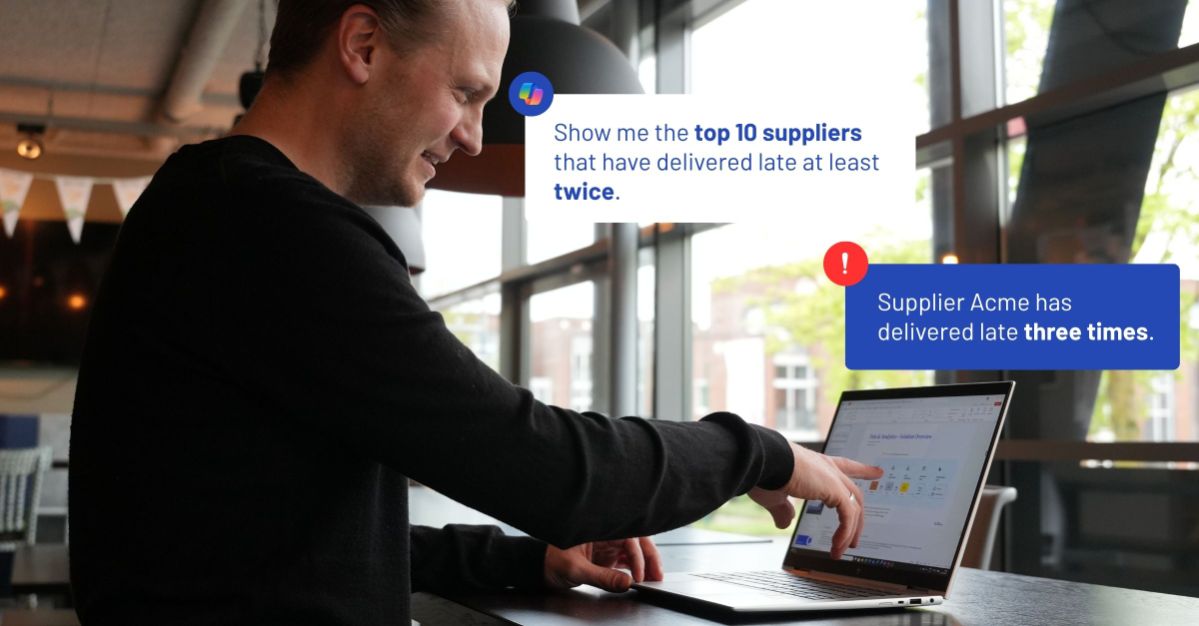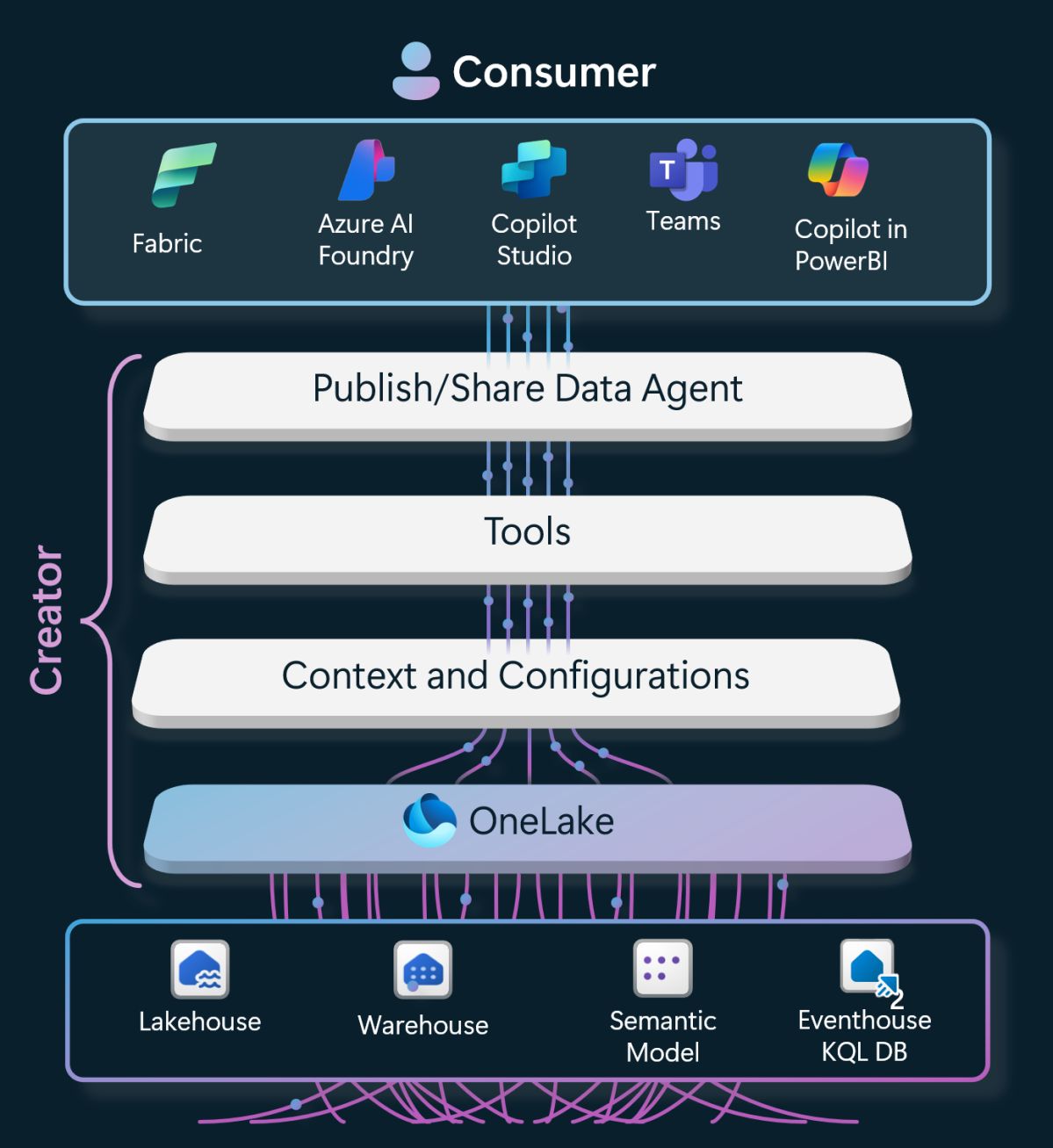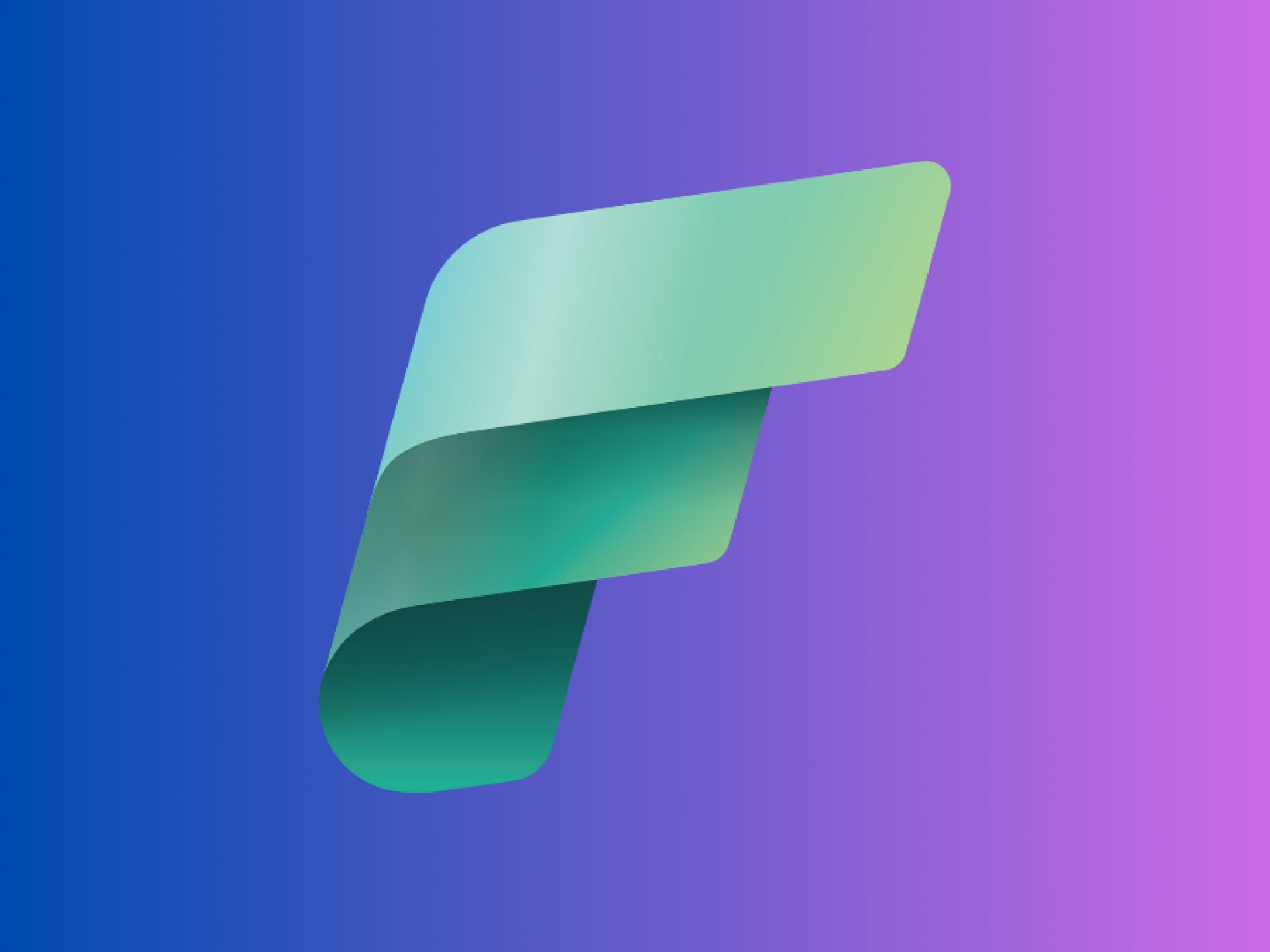
Business Intelligence has long been the way to gain insight from your data, mainly by looking back. That hasn’t changed; data is still based on what has already happened. But the way organizations interact with that data is changing.
Until recently, you had to actively open dashboards and analyze reports yourself. Now, Data Agents can automatically notify you when something relevant happens — and even suggest what to do next.
You’ll still use Power BI reports to get an overview and historical context, but you no longer have to rely on them alone.
Think of it this way: a Data Agent is like a smart assistant that keeps an eye on your business rules and goals — and notifies you the moment something deviates. And with Copilot, you can immediately ask follow-up questions to understand the issue, without digging through data yourself.
It’s like having a BI analyst at your side — only in digital form.
Data Agents operate within Microsoft Fabric
Data Agents are an integral part of Microsoft Fabric — Microsoft’s all-in-one data platform. It brings everything related to data together: storage, modeling, analysis, security, and action.
Where you previously worked with separate tools like Power BI, Dataflows, Synapse, or Data Factory, Fabric unifies them in a single environment with one central data lake: OneLake.
Microsoft Fabric is built with a strong focus on a few critical principles:
- Governance and security
Who has access to which data? That’s essential in an era where data is increasingly sensitive. - Collaboration between IT and the business
No more silos — instead, one team working together to create data-driven solutions. - Smart tools like Copilot and Data Agents
These don’t just help you analyze data, but also allow you to use it proactively in your daily workflows.

What exactly is a Data Agent?
A Data Agent is an AI-powered assistant in Microsoft Fabric that monitors your data in the background and notifies you as soon as something falls outside the expected range — based on rules and scenarios you define yourself. It’s not a standard alert, but a tailored agent, configured to fit your department, your organization, and even your specific role. After all, what matters to an HR manager is very different from what’s relevant to a supply chain planner. In larger organizations, access to data is often restricted by role or department — and Data Agents respect those boundaries. You’ll never receive notifications or insights for data you’re not authorized to see. Once your agent is configured, it continuously monitors your data. When a rule is triggered:
- You automatically receive a notification (e.g., via Teams or Outlook)
- Follow-up actions may be suggested
- Or a task is carried out directly — such as creating a task, sharing a report, or launching additional analysis
What can a Data Agent actually do?
A Data Agent is more than just a trigger mechanism. It’s an intelligent layer on top of your data model — working in real time and focused on taking action. These are its core capabilities:
- Detecting anomalies based on rules you’ve defined
- Sending alerts via Teams, Outlook, or other Microsoft 365 channels
- Suggesting or performing actions — such as creating tasks, sending emails, or launching deeper analysis
- Collaborating with Copilot — allowing you to ask follow-up questions or request more context using natural language
- Working across multiple data sources — including Dynamics ERP, CRM systems, HR tools, and external databases (as long as they’re available in Microsoft Fabric)
While you interact with it using simple instructions, the underlying engine uses AI to smartly detect anomalies, understand the context, and suggest the right actions — without you having to build complex logic yourself.
Think of it as hiring a seasoned data scientist — just without the salary.
Why this is valuable for you?
Many people in organizations have access to dashboards — but don’t use them every day. Often because they’re focused on their actual work, not on analyzing data.
Data Agents flip that dynamic:
You no longer have to search for insights — they come to you.
You’re only notified when it matters, and you don’t need to be a specialist to act on it.
You’re actively alerted when it counts.
No more wasting time on irrelevant data.
You can respond quickly, without relying on a BI team.
You instantly get the information you need to take action.
You work within the tools you already use, like Teams, Outlook, or mobile.
No new platforms to learn — just work the way you’re used to.
You only see insights that are relevant to your role.
No information overload — just what matters to you.
What does that mean for your day-to-day work?
Let’s take a look at a few real-world scenarios. Imagine having a Data Agent that’s tailored to your specific role and responsibilities. What could it do for you?
Finance:
- Alert me if travel expenses exceed the budget by more than 20% and send it to the CFO
- Every Monday, show me which general ledger accounts have significantly increased
HR:
- Notify me if absenteeism in a team rises above 6%
- Give me a monthly overview of departments with consistently short-term absences
Operations / Supply Chain:
- If a supplier is late three times in a row, assign it to the procurement team
- Alert me when stock levels drop below the minimum
Sales:
- Notify me if a top customer hasn’t placed an order in three weeks
- Every morning, send me a list of leads that haven’t been followed up on for a week
Not a replacement, but an accelerator
Power BI dashboards still matter. They give you a clear overview of trends and historical context at a glance.
But dashboards still require active interaction — you have to open them, apply filters, and interpret the results. Data Agents complement that role.
They help you spot when something unusual is happening, and highlight what deserves your attention — often before you would have looked yourself.
Conclusion
Data Agents in Microsoft Fabric take BI to the next level. They don’t just help you analyze data — they empower you to act on what’s happening in your organization, without the need to search, filter, or wait.
For organizations already using Power BI and Dynamics — especially those with an end-to-end solution like Birds BI that structures data from source to report — Data Agents are a natural next step.
They make your data more actionable, your insights more accessible, and your decisions faster.
No extra tools. No complex setup. Just smarter use of what you already have.
The author
Pim van der Kwaak
I help organizations unlock their growth potential through data-driven insights and concrete, impactful solutions.




